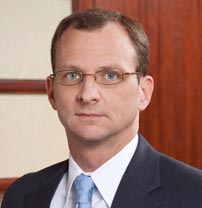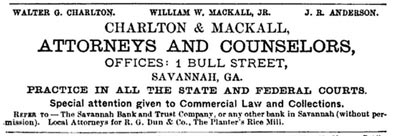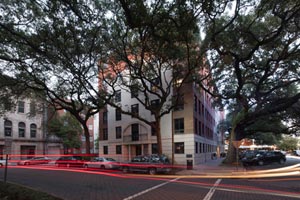December 16, 2014
By Lucy Adams, as published in Georgia CEO on December 16, 2014

2014 marks the 135th anniversary of HunterMaclean. The Savannah law firm that started in 1879 with two founders now boasts 48 attorneys (with two more slated to join in 2015), 12 paralegals, and 48 support staff and employees. Its journey has taken it from a small office at 1 Bull Street to a 40,000 square foot space at 200 East St. Julian, plus a Brunswick office that opened in 2002. When typed in a centered format, the lengthy list of name changes of the HunterMaclean law firm, which began as Collier & Charlton, takes the abstract form of a Christmas tree lacking only the star on top. “The practice of including the partners’ names in the name of the firm meant that the firm’s name grew as the firm grew,” explains Frank Macgill, Managing Partner.
The firm’s expanding list of partner names, which from 1966-1980 topped out at six – first Connerat, Dunn, Hunter, Houlihan, Maclean & Exley and then Hunter, Houlihan, Maclean, Exley, Dunn & Connerat – led some Savannahians to refer to the firm as “Hunter, Houlihan and everybody.” Though the current legal name is Hunter, Maclean, Exley & Dunn (since 1980), the firm is better recognized today by its trade name. “The trade name of HunterMaclean was introduced in 1999 to honor our history while providing a more modern, compact way to refer to the firm,” says Macgill.
This month, Georgia CEO spoke with Frank Macgill regarding HunterMaclean’s history, areas of expertise, milestone anniversary and future:
Georgia CEO: Describe how the firm at its inception reflected the economic climate in the state of Georgia at the end of the 19th century.
Macgill: The firm listed itself as practicing “Commerce Law,” which we now call Business Law. Even in the 19th century, the Savannah port was an important economic driver. It handled agricultural exports to Europe (mostly cotton) and incoming manufactured goods. New railroad lines improved traditional river and road transport of goods. The firm paralleled all of that history in that it had an important maritime law practice and represented banks, railroads, and commercial support systems like warehouses and mills, which are strengths that have continued into the present.
Georgia CEO: How did the activities of the firm change through the 20th century?
Macgill: When the cotton economy was decimated by the boll weevil, Savannah went through a difficult period before emerging as a manufacturing center. The firm’s practices reflected this change, and the attorneys began representing manufacturers. We still do today. Many business transactions were taking place, and our lawyers assisted with contracts and agreements as well as litigation. As local commerce increased in complexity, the firm began to reflect that diversity with new practice areas.
This evolution has continued with practices in health care, information technology, intellectual property, employment, zoning and land use, environmental law, immigration, logistics, affordable housing, nonprofit organizations and other 21st century practices. The firm has a top-ranked business litigation practice that has also grown in specialization to include employment, medical malpractice, insurance defense, construction and real estate. Corporate attorneys manage complex business transactions, company start-ups, mergers and acquisitions, business sales, and business succession, while tax attorneys handle increasingly complex corporate taxation matters, ERISA/employee benefits and trusts & estates. Businesses require different kinds of legal work at different points in their business life cycle, and HunterMaclean is able to offer comprehensive services under one roof.
Georgia CEO: Are there any clients (even if the business has changed names) that have been with the firm since its beginning, since the near beginning, or on a long-term basis?
Macgill: In 1903, one of the specialties of then Anderson, Cann & Cann was maritime law, and the firm acted as a regional representative for various London-based protection and indemnity (P&I) clubs. The firm still represents those clubs, as well as other clubs worldwide, in the largest maritime practice in coastal Georgia.
Malcolm Maclean, namesake partner and former mayor of Savannah, was very involved in bringing Grumman Aircraft Engineering (now Gulfstream Aerospace/General Dynamics) to Savannah and was one of the people who laid the groundwork for Memorial Hospital.
The firm also has longstanding clients in Great Dane Trailers, Byrd Cookie Company and CSX Realty.

Georgia CEO: How has the firm adapted to the digital age and innovations in communication?
Macgill: HunterMaclean was one of the first law firms in the area to computerize document production and accounting. The original computer was a large mainframe that had its own room and air conditioner. The firm was also the first law firm with a full website. (In press coverage of the launch of the site, another local lawyer was quoted as saying, “I don’t know why a law firm would need a website.”)
An important part of our client service is making sure that our work processes are as efficient as possible, and technology is certainly a part of that. Document creation, discovery and research are just a few of the areas that have been streamlined by technology. Computers and electronic communication are such a vital part of the firm that we have a Chief Technology Officer and IT team to make sure that everything is up and running at all times, including remote access, electronic security, disaster recovery and business continuation protocols. This allows us to assure our clients that if normal business is interrupted by a weather event or anything else, the firm can be up and running within hours from remote locations with access to all documents and applications so that we can continue to serve our clients’ needs.
However, our greatest resource is the attorneys themselves and how they practice law. Technology supports the attorneys and creates an efficient delivery system, but at its core, the strength of a law firm is its lawyers and their ability to solve clients’ legal problems. Being in business for 135 years has created a reservoir of institutional knowledge that has given us strength and stability as well as years of experience and insight that we can share with our clients.
Georgia CEO: What is the significance of celebrating your firm’s 135th anniversary?
Macgill: The firm’s success is built on its strong relationships with and service to its clients. Rather than a celebration of arriving at a certain year, the firm has used the opportunity to reinforce our commitment to those clients and to providing legal services best suited to their needs.
Community service has been an integral part of the firm since its inception. In our 135th year, HunterMaclean attorneys serve on nonprofit boards, civic boards, church and synagogue boards and on the boards of other Savannah institutions like Telfair Museums, founded in 1883, and Bethesda Academy, founded in 1740. We certainly celebrate that.
Georgia CEO: What value does the law firm of HunterMaclean bring to the state of Georgia?
Macgill: HunterMaclean provides high-level, comprehensive legal resources to the entirety of Georgia and adjacent coastal South Carolina—every sized community, every sized business. Although HunterMaclean represents large, multi-national companies, much of our client base is individuals and small to mid-sized privately-held Georgia businesses.

Georgia CEO: How does the firm maintain the balance between being an integral participant in the state’s commerce and being an arm of service by providing fair and honest legal counsel for those in need of it?
Macgill: Being a lawyer often requires understanding the perspective and challenges of a business person. Each lawyer’s practice, and each law firm, is likewise a business that needs care and oversight beyond the practice of law. Even so, law is and remains a profession, as it has always been, in which the first obligation is to the client, with co-existing duties owed to the Courts and to the public. On a practical level, the long-term economic interest of the firm is also served by putting those duties first. By successfully assisting clients with their legal needs, we are investing in our own business future.
Georgia CEO: What’s on the horizon for HunterMaclean? What can clients and the public expect to see in the next 5, 10, 20 years?
Macgill: The firm’s practice areas will continue to evolve and grow along with Georgia commerce. Health care, hospitality and logistics are strong economic sectors and practice areas and look to remain so. The firm will continue to stay at the forefront of practice innovation in order to provide our clients with the highest quality work and best possible service. With entrepreneurship and tech businesses as a growth sector, the firm will work to become the law firm of choice for the next generation of Georgia legacy businesses.
Though the names on the firm’s shingle, the faces in its hallways, the signatures on its documents have changed over the past thirteen-and-a-half decades, the principles put in place by its founders have not. The men and women of HunterMaclean continue to practice law in the tradition of Collier & Charlton. “Broadly speaking, our firm is a transactional and litigation firm. We are guided by a strategic plan and operate under a core set of values that define our professional culture and the legal services we provide,” Macgill says. Taking care of clients according to that core set of values is itself a daily celebration of the firm’s staying power. That’s the star on the 135-year-old (and growing) tree.
Happy 135th anniversary HunterMaclean!




